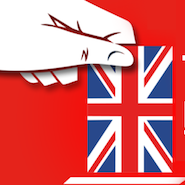By Graham Painter
If you were looking for a metaphor for the immediate impact of Brexit, a tornado would seem most apt.
Consumer confidence? Sucked in, chewed up, spat out. YouGov/Cebr claims it has experienced its biggest fall in 21 years, post-referendum. The pound? Propelled into a rapid downward spiral and now plumbing depths not seen since the mid 1980s. The business reaction? Hatches battened down – in this case, by freezing recruitment and investment decisions – to ride out the storm.
But this immediate impact is like a tornado in another sense, too: destructive, but short-lived and prone to blow itself out.
Sterling examples
Luxury marketers need to look beyond this short, sharp, natural disaster that has beset the United Kingdom's economy. And in that regard, the impact of Brexit is more nuanced, with pros as well as cons depending on the nature of the luxury business.
 Graham Painter is CEO of Cream UK
Graham Painter is CEO of Cream UK
Take the weakened state of sterling: for some businesses it is good news, for others, bad. The luxury travel sector is a prime example.
Those luxury hotels and travel businesses relying on well-heeled U.K. holidaymakers traveling overseas would be wise to tighten their belts.
Hedged currency will eventually run out and holiday costs will rise sharply – particularly to those destinations priced in United States dollars – and that is most of the world outside the European Union. The likelihood is fewer will travel, and those who do will have less to spend.
Luxury hotel operators in the U.K., however, have no doubt been exchanging high-fives and fist bumps. The weak pound makes the U.K. an attractive destination for overseas visitors who will have plenty more cash in their pockets.
Domestic tourism will also see a surge as would-be jetsetters survey the reality of the exchange rate boards and decide a “staycation” is the prudent option this year.
For U.K. retailers, the outlook depends on which markets contribute most to their sales, overseas or domestic.
Those with big international profiles and prominent London shops may well benefit, especially the likes of Burberry and Mulberry. The hordes of exchange-rate-enriched tourists that the weak pound brings into the U.K. will be a welcome boost to their sales.
And this pull effect is no theory: it is already manifesting in practice. The demand for U.K. holidays from China has skyrocketed and Chinese consumers are not only the biggest buyers of high-end goods, they prefer to make those purchases overseas, too.
MainFirst Bank AG analyst John Guy estimates that a 10 percent fall in sterling could be worth as much as £90 million ($120 million) to Burberry's pre-tax earnings.
But U.K. retailers who rely on the domestic demand will be punished on two fronts: weak demand from U.K. consumers further exacerbated by price inflation caused by purchasing goods from abroad with a weakened pound.
Retailer John Lewis managing director Andy Street has already flagged this as a problem for his brand when its hedged currency runs out: two-thirds of John Lewis products are imported, of which half are purchased in the U.S.
Where each luxury brand sources its materials and labor will also be key.
Inflated fears
It is predicted that inflation will return to the fashion industry as much is produced and imported from Europe and Asia, with a dampening effect on demand or margin, depending on whether the companies affected pass that inflation on to their customers in higher prices or not.
 Brexit: The ayes have it
Brexit: The ayes have it
However, for those that produce in the U.K. and rely primarily on exports, such as the Scottish whisky industry, reels of joy are in order as they will avoid the escalation of costs and benefit from a reduction in relative price compared to overseas manufactured rivals.
Looking beyond exchange rates, the medium-term effect of Brexit on domestic demand is less clear cut, although the likely impact of all this uncertainty is at least a postponement of big-ticket purchases which will, at best, lead to a slowdown in growth and, at worst, to a shallow recession.
But even recession opens up opportunities for luxury brands shrewd enough to recognize them.
Big-ticket items may well be postponed, but the need for consumers to reward themselves with occasional luxury purchases does not go away – it is just that these rewards become more modest in scale.
The last recession saw a growth in sales of items such as luxury chocolates – an affordable pleasure – and the recession-proof nature of the luxury lingerie industry no doubt reflects the fact that this sort of luxury treat does not need to break the bank.
No dice
The cutback in media spend by those tightening their belts can also lead to opportunities to make the same marketing budget deliver a larger share of voice.
Media deflation is an opportunity for all brands, not just those for whom the Brexitdice have fallen favorably. It has been proven that those that increase their relative share of voice in tougher times are the biggest beneficiaries when consumer confidence returns, although marketers' success in selling this may depend on how enlightened their FD is.
Beyond any medium term slowdown or shallow recession, the impact of Brexit will depend most on the success of the negotiations with our European partners.
New Prime Minister Theresa May has made it clear that there will be no free movement of labor in any deal with the E.U., and German Chancellor Angela Merkel has made it clear there will be no access to the single market without free movement.
Even non-EU members such as Iceland and Norway have to abide by the free movement principle to retain access to the single market.
It is likely that the U.K. will not be able to have its cake and eat it, so there will be penalties for U.K. companies exporting their goods to the E.U., although what they are and on which sectors they will fall is impossible to tell.
Needless to say, U.K. luxury brands that rely heavily on E.U. consumers will be wise to explore other potential export markets, including Asia and the U.S., over the coming years.
THE IMMEDIATE impact of Brexit may well have been like a tornado tearing through the economic and political fabric of our society.
But with some political stability – and the evidence is Theresa May's accession to prime minister is bringing that – the storm is abating.
The skies are still grey and threatening, but for those that throw open the hatches and look up into the sky, there are gaps in the clouds.
Graham Painter is CEO of Cream UK, London. Reach him at [email protected].
{"ct":"fvzkBU5wDIFD0Ggzdi8THts+UivQyzcgHVd9emKvcMJd862d9anFjh\/8HM9dAUOerF8OFH82i2fs4PjjOA3TEhuG+EJO75gH1mTxWPKk1XlPqrXMaOiHLDXiCEQPhZ5nPehziBzUYtUf2POES0EP4X1c7UGAMw9Ns4SXF\/43AsMOuHDyaUY5PZ68PBQpduBZJ6aSedPZZNU8pswxvsYf+QxUl8Y82fMJyL7aZGMJ8GnEX1FeIV6SV0\/Dn\/Ou0pdu95Hiv+mqonuMmTfsqve3euzILOv5+xvvP5zjuwImXapSMVA6dgZPtxBzYSBE6dVqpkb+Ow4mUd2DpmPP+gJc0gYC1oPFXDlH2VCP6zOD+WVNjyawHzYFIxSa\/BDimYR9ETijbrKmVKydUJ+u+aqJt7q3ZnnLu3un3jkB7NP83szU9NMOxvSw0jDZ3Z+WTKE+0mO3YREoUWRRy74\/K34QXjrWOP00gMSCATgMJaWVfCDOFW6bs5T2Dy1QmiSUiwpw96yxemRq1uYbqvU3ZydEIyPd76hRENbY29yF\/me0RKw3++VVJMqtmhqwFnZleLwf+KrOYTL3wpN2DJzGuVqLzx7th5shJgKx5AuhHwCtD1cFPsY4id1hHkHPWZtp2nROTwL6uiEeoBvoPRR0MfdlwEzVv2pytrT65o85z5NXRgOPX3mIs\/r1TuyQ73jKCuw4gXPKVOOLigSoewKs4\/hscnxznAp6T9xP7ieMZFPAOQNuADwanxXV59Gflo8rgIxYwLj4\/BHaNEG0LrV6+Hr0iO9P21wB6rt6Cpw5zHL0kuiP81dBwtMfpPVdmywMew1YKcXFp3JdfO3G+MHkWKPksDY\/WLIRuDyv0fhuZrhOYkeOqvfoYjT5VtwjGAHz17qK99h+40wJScQbhk1gToFg228Jg1ENzbRR7J7KA0Eo0Ai5cR5BAjiX+i31Kp8zvEDOlK\/Pre5euYBxxujNQWrEG1YV3nRhdLd\/hy02Q\/4MECTdduq6dVRZa7frtx5Q87bGoxippCrjKS5Qy36Kx22224HvnSNu8\/+ulCWZ5Iw0q00AB1Tq1lrT5bhHrt0jQzPvVMc69Y5sJikWMbCu2JaBKecTSfwAni1llDOMTO6TaE+11Fi02DgkYqhppc8LBKaabJLFUZYNgpGZCFcJqdg1mU2cqnp+7UeZVo\/JX+RDdf7ihCC0d\/+lsxHV7qCGOMh0\/N8iWRBaE7LGU0rAvApuXIL+XYdwWfNeYcPky0\/YbhGyknNvmtM7WNpG6upEqpYOV6wmZxKY\/9YRCuZZ09MyML+A5WctJkEoOXXFV+la01hjCqwlw\/3FpT3gW5qtpZtnyenIF9n\/j87yNYGkYiRKvgMgEad73xqBNBjqo8r0ATaPc56QCg4VFJbpy5z8X1yddot8iT9lltzoARKpHJoYy1vlrb9gThHefwRoezlFQh02oLFRvgN69JRda8xmmoASUEm+8EKEItwLo\/iQJUqJa9QYh+k2smaLUILJ4GHlYuxevO780HPnInRI+ilEiVEGmld4WHetR70fpE8JgYaalbqhVkO1kH7ibMa7vb1wQepgOKaKsue+steyHwpq8zdddiipMsGplQZU634IrAOD+k4dAj6A1KrL8Mx4wXbshey5GXpM+hXkfh4b4cy9tAEu3OeeLLYpDNR63xC6ZPSXY\/IEba3fS94zyBfD9rpn1CQxshsfbUnQz4+ulN6esv3wpZeKwN8NmAtw314UnZ3D0b6bdBSGR1CaJ29Ww7Kz3qmCHA94RC4PmZHSXhm3t8du1AxvL821qfZFn6+yNHgwXZZY0AhFJ\/RoePMZ59WSScIf0d4RKJMq7HkxGdJZb9lgeQEtkZLcQH9pQoJMmTiiczlTNWPGmW8EX7+tGIdp\/Rws9egjSLw9nSoRxfN1EukC5Ad5D+wm8d+IkxEr5h0\/hcvLQeNVgHEnkaRQUx7QciPnC90h29NOTuv8Vl9wheYEqgHoxppREcJY8HWN5KaQ5818\/KGC11JAGKAPi993ozpTC1qp6SVeMpyzpMugGIBbTvVZa7IUOFTZxkJxVNXVgkbZCaTjjWweT02mNwSa9egLrVqVhHb06lYqzRpfigS8PNpigVfPJafZX5C3GDBAQJO\/+ZbrO\/PupCUkRJFsdunOIVyYL1yUF7v651KjfP3jrrfHIQ0Uadr7ahF\/8CHUUBy6xDVJ0yxicecC2uqgqns7cC9k3smbACOgwvwZAR2Ij3IhBcKPa5YiSfZD9OB1dviWkZuorSohNV6x4wHfpanhm+a4zliuG\/kOa8Zf35ViHfo7k2wlJr3X962jgqVvR5g5oKqChcdCXgAgon9oPjpUns8ZxTVke\/yEYFS6B1lM1brCvqx\/LNQSUTB6MGZbxfgAloxwCpiZEbwpbZ1l2Uza3\/z0luaiyqDaeNEnBsTd478M097kCev\/7mkH2KO3D2BJZvFHdky5m48lId2++o92hI4vL7oSAIi+gZGHnk5nP4lHS59+FI2fU+R3QQDYm2m9mWu99I9K7v4tEVaXBGMWRo4ddhcO9wai+DwiByO5uJciX867evyb6LXGYRGpWVgh6ROWajShfVnzZUZRAa+0LJJBOmfDGiM3BGQQoOEbNyepobY5U0vI\/YVa2BdP1twFs2VWHRNyaUHMWcJZQ\/qvI9VcnasGvqySJwVJtvIJkCvh65IhnYPnmDgpkMvTU4fUGHoj\/O0hArAnE+lgaKH881WlSMGAKd\/\/QU0VDicZGxzG6+KUeJzIkg3ym5mcAnGn+zJ4QO5wPh8UTMvtbhnPmEc6lwOrsiAhI+bk7mXi6X55Ub+Fprw8PZemaEZxFqelfQOri+af+mjXn4hk3H4rAYMvxNtf3IZ2Mtog3UmhndJOq3ru4qSDVmor\/zrwQp9UnMExF4WRNoYwSHy49nJT8mq1G25273P\/swBW25K08TRrsaBcdSkkxUJPc1a1qo7hpxah\/cmh\/hkFwb4gjP0tA9W7TH8fC61xIKJMHZNodhbsc4ZTHr3QnsojEOlqQSeK1Lu2IPnW+H2r8NA4I6kxNVhLdwrDhhuYp7JbyFNAIDE6NvHbG7YxoGztBLb+ZJ0rYbGGnsZniAPCA1DMjDYEs6FOcjO+q3dzOficSU6hyOUVO55pvBZ2Nso9vs8rMMoMIKlZBsp+\/DVRqaRwm9qcM9Q7M3RyTNbSX3iOETQLbVYhXKM0e0rb8+MTXoXOhA7hQFxjZqU6xuthOKIYlXE6ysk+78l2dbII0dWkL+711cGk6ANtGi+0t87OMJucBG8FjUYdxJEYrpHQMaIGQiI5P5vJiCbvvqj\/C23t\/yoYObdgswzmKphjqoXlizqPYHHYeZ4H+wnoM5hCdmU4UCLq00uNagV5wD8dCow6vi0WJpRO0QzqY2vPxlGoZAxXCmMq\/hTxnEh2E4\/rxVP1fnsx0xzOsStAFSXZO0TcQMJRHVkCsB637BYUIpum0rpOSyG+IBu+YKjEJOSx9U616DGWoNLtmzwxDc3N+8Y+zOWnkrWiihlULHhsOuNwEr+AdxaKFc29yrN5EdphaNgo0FgsQsE2BDZUgNHJD4WQn89NR9\/GHde6ijQeLs\/U7BKL0Tg3Gi3yvX8kXcXdpMntGuziVwvZkOyQonta8c2ApcBwIjqav64B5EJtPDyGP90SNFvtg3Ud1gN6Pi22Fw4O1xFFz7PvGUdovJ2I4qsJU3xGXrHnWSj9UIBlKWXpr7t8HhUuB6bQalaoV3BmLEKKCctxNHM9D+PQeW22KSjS5qWwYpZ1empzJ\/9xhxwqssHX3T6eritH6\/UREbcoipM6jx+r0EgOEuumfDGoTGS+iDOEoQSU\/zso4s1wGEpB7PIXsLemooOXsCOTLGC6Zw4ltAePTWh8RpNzY+sQDTJr4KbqRpVJhWq2Knkktoem06rSHjsYBu4e+S1X1IW5t\/mFLp4ZsOGwzRXo7s6Sa1F4f8Gb7\/MRZVV8f5Jbolc2LB1SWUi0az1Sx4P8CX77dD9BHc1cETrUQqjcj6ynzMyydfbNnmTnyGzucqQcLZG\/yFLvsrYV2Jk6hTsBoLZJgeg3F6k8ZUtPDx3oISoZ14SiwSiiPn9g+vPAuWI8xwO40PfXFit5T6DPHg0miMICOHm1qKjZ45vVNIlXjbid68clWryaUWo6zCnWy5y2++PTo6Ci3Sanjztphwgytt6gpI4M\/OYh6ciQttJljBYTUGzSibpCiL7AgAGRSJrGzVftSco0zIr0TOydkOkSwGEdQuzVyJa7J7l4xgjvGEUsvZwIg7lVEWIYd+UUSSooS3m8eUAwxgTV8K85RvUUP+KAzmYn75g6o8hzJhgGEiQ1PeM\/CLUbVf\/glTxslcIlBufMeI6Dti0CnE8lZxjmGq+gVvSgs4tu655oCH7k8C7m1rn8mteMk0TEqX\/EOZq26n4zWjggvq2zepK2fMBu6KxBDIRW6G5EYcTsOawhhh1p0HSm6zhCcRi1Riuep2WSbJIjMSILxI7G8JenUlBZttwiKM67JDPxqXUNTSJb9JbtP5I3xXolq\/rJVZhoMlV7m4oDgWFWeuD32jpl3k8aP0YsKLjS0w6RANi2uBj+URxJTLs\/NrdYLNycfbD\/UhNvT5NBh0XwPBSEXmgJYxxCO86rKpn4Qs0d7d+FW4c6iZbeJ0Y2QCjA2h1fmj\/dOUjOs5iB0DWpOQGejTi653q1BGXeVhNyaq6RMHEoHnsxYxj8pCj9GyydzFIshhS87CucXNB2Y9tBlqqTMOdgtRvvkU+eVHAnhr7y+BdbdLiXgv8KoTaKLbPdDx5MtXBasCgDFpQ4tOgmcAT+GVslVp45XU35p3luVjgJz9v4ParZg3vx5uaskPHZEwIPk1YRDhHUxlEkhecOyzM4I8TzDA4AkccNhxhZEUYUBypWEmCHUjgzW\/e4ehd4vaEJmLd5BJGehNB9f6oqG9NQr6FFj3\/dXCpgjwnfD0TnTSrRJZdhB4F37x5UiOT4SqV6sP6NB2COueXTxMZnzK3hEtyUZkOoOn05iZOLP8y\/lAAwaVKutJpnWgdKHFST85amYsyTria4j\/bq1fcR6q8DhTjJ0Zw7BYVdWgpVsso9txC0rYa0g\/ixROSXlUaDrDJqGfiJx\/N0vDLxshBdjqm9b3K+DSPuH2flT658CK\/EtYl3mCzX8K5U2CnWxwMeO1EB9v4FqzuwYDrK1Orx29mIRHvwqtFKh8JGOwmLyw926UQSEe2h6Ub3DqZYEnOsb2T\/7IaRcZ++uQLWyGvF+oTxzv2O3EF4L+BsrZNOupeS7ZSEJ+Zkjakoo73monxj5VjtJUvHquWm+ovj+f121IN6BtwNPd1qulV8KxsNDCCBKiPIlcU+dguuZv7nF518R3VLUA4NIqfqqFjFxkOoZMvnmvMCEhwiOrRS\/eij4UkejvThXoNliIVZsa01xQaTMnY+mgzVJEeV9OvF78ZeehzIt+AsJbauKSZN7WUqC\/DuW\/pW6btm4Drxrmnuf6NVSqMzmQCOvq5ZKM+Lo545YOzHkruaAslMi0XuT1YMgcX25fU0+SBnDYgSqaSj1Qp4TNxcHcclLbVVybwjSBuPLoHgEm9B0vw6A2dcuAFaBYTZfSCOtTh1n7khURcmMqh8T3KLGkzjlzRbtaXScq+XSewWdK3FAwgqlfL3g5aDkCQxzhuyN9ZiGWk3Bqi+ztxqlOwhoGBKd2krEFXtpd1VZBpbAYvrh69fJnmRBPcDslXG4UlHi\/SMwDCsPoq4aJi9t2EmPjXiYdnSRjjiBi296XFeTBeOGzSgKTNMrSoA5xMrAOok76q8Q8KFoaI9VV\/1FOO44xvsVhlZ0WWyahS2hUlvrWQ\/vfVKWXrRXVPgjZeG91yLI1VvimKBiOmLDxQ2wGT3Hr\/rgrjdC5K8r5H9H3OekNFRAC6dYz9Mztt0rm4\/OezmlWUl4MpQX\/OAcAu1N\/DQfC+qUd9QQZRelsSr9aQlY2GYXYLktBcQfFOyhhnICdxzUYzMz5aGyHUNK1I+uDsaM5tmbHCo90xFFpD+eciAHXz5FGnAj7cp1mbaaAXdID\/SXPFR9fyYvw1E8vz0vqXOa7njwdNSjJ\/7vHuuFYDdv45GCTlouqLz12o1\/dLOJXkt0VxARKPC9TbLtH5MaeOQe628ojHu6e8BnZnSTzREZ62kC6NGO4I7miMrhW6kgnpq+ENvOYHhWAMu8+0HE6Rx5dydo8dQshvtN92MBGkiKM32VAw0b9oXznW1RMQSWnP3wqduf\/g4V89kNngRuVdtr+EFW7JVXHa+GQgUdbwtEzWOsLM8X7EjKa+RLNHi4HilZf5q\/wexyIy\/iH9MoRg8z6NpYorHeFnIzAPfr0zP1P9x2swEzIYeK2JB+lWHxcvSv3p5ZMIP7fJgHpb69HrOTfyV0E+3LEfcp+1tt7KnUZo0dg1QST9OEt+GgyIkMcp+l1zNmOzivkSLa0SUcbCaYv1NPR2KGfZi9uHCtjQPAPeJuI+KCATkA6eDEiV4g3ExchPbNy4EPNT95nFQSqHuPQJ+enOEwVpVWBIzcwgJV\/YPAlxKI98\/2jviWAHNenEJk0vevLZSfnwukhZYpmO0MFF\/SGw1ojfXAXKahmLg+Trz2mRA\/2Jj5SJCnjEf978mApyr2+dFDjSve8uroRdXxO1mSGKcGRllMUdA0sfxl68E8XdmuDZk3mUJo2WPNwC1IqEWGrCpyRMa\/vdUcsaBDfHCyYx5CERrGXRNnxB6ZysDJGAQcVkB4dLc9EsOlQ3P8m1yzzYlmnEu+ulYCtfh4EN76Qg0tDN2\/Grk0jr8eqw24Lrn4pQ+RZqiqBy41N\/juN1eWh3hvuQZItvVuNof+kULGSpL37szqLnJgSjAaPl6Cps8A\/Tl8BAH3b\/8Fr6k4HfoltFrlOnbGIn7BEaVAwTg4hXbyFq\/zcNLfJ1ifokhQrq0vGuQ2QZTE6FYJnaE\/4qtS\/x4GpBvDh\/fe4b+8PqG4hM4A0f6V5ZaEZseZiCkBcuhF4H8PQe4dnoVtmf6TF6eOOtNe2BX8YyJAOZaD0x3NAcKRzpJ3s6\/J7+qsDaEq7OVcK6j+g+a+7f\/AGKQWV1ESAS9T4DaqxyeK8LSw\/h+tSl5LNYEcVUbTzY4zVp0+Kdy8s2Z1ofgEDdNcCDYveHjfkt5njy9W7A6wQId+bPrRsm9C\/rtkbv2tcLAGhJStXTEabDVPacVTIeLwmvCw+oo2XitRHaXiJgQsAJNDPYnj+wTfEb\/aq0+VyxwJAJexcCWWnPpoU0o2MJdjaNNUTyeXmWUFlcxDArStwtsylzkMuMLP58CrCOgsH+pxwOJXETb30AdwxCrHpN8Zbaqqmil8J8kQ2C2v0qNRlb5g33byl8BBfoIPsrnuYfB6PB7mOWVgLrELQ2tES5meXoEPwoyczrZJkJTwvJJ1NG\/UB15O6O9yom+Y60mtAis042bsaucWGj48DaoqtgqvI69aujSYujqtiCj5kL\/SNCXBRxdUV0AXvI0qndYn+yLo6h9NKAfal4D4MSw0flboeFWNR7HEF3GxldAMiJVqTwpcIXp3ODUPaTT+mY9GbETsEw8eb3TXL9qCTGPejIdRsVdiAh05mbZFm2LdaiJdfVWoS3a9x4lBgHWgnwxs7\/i4LFYpu6L34fqbH3eFxZJzvSlu9ZdiI5sxptNDKnTE2gKr\/qxm2axi2oEPyVwgWtafvz3C7X87OeOGk9O67cpHLs0R4B0WOBuW02w\/qTJwnwbzFMXQrr6fYFDforxYG4\/Qm+KllXMgE6\/YiRLz6EHY7S4\/8mRx3V25o1+m\/MrNJolL3DkjMsZmUEmRgURoZIzkarjbCWhMko8mtF1ryNd+tya0dqC60GJ\/P8N+Tv6M8AMI2a5LLkcOfzb8vLZ0ijMKlnuFv\/a6gLJuB+JwPI7toczJugWnK1VthFqQAnyryEDdI2kexjkM951mHs6lWN2Mcmk5gnK76acR\/VYHSiEglcgUN2LHPKY44l70tmwAH89HRWwXfYPLAYjhQHp45aM7PP+j6T2Mi1tDm8fQv4LC8oqNOga3bnh56NkHf526welR6RI\/1wz4Jz+BiQQOIkl09XAQEbD2V0sXhiZy+F8oRz1W2Xos5BJezfDyYOOaJ1wbVIEtntOj2v08yhNgIVANEvajZhFTv5ZtiaZn2w0FSMVhmUCrzH3YOr4qqfLh\/YsLC5H1pP7sjDY1sURdpn\/A94X7WLMUsyPJED+qd8x+HXBoWAU\/oZIuvRMJOTteIR2pNwr3z+I5X6qRLiL9sn40KmAY3q+KjEKoW0aVwfsmA0lkw5jyfqmZuK0TJqhUtPzpMBFryPdRnH37Ld9v+LkZCDT9I7Ld3tWJVLZox7V3ADUoK\/CyJyvvjJYlCCAkfOecNJWh5K3J2T5D2XVW69aGhg4pJant5ei+V430fjPcXEMKWBshyiP2xAFB0g6hfmnFgZSOzpOL0E8iqmFWNbAYWqFhVEgL5PmzQtUWila8E23r1T5PfEwZhHmYQG9TiulU8SaWpVPQwzDLCcxGeyS9dT0BmUHRQj7r8wimvFxHthsMhVDP8cG\/deMOUX2r4B8iQSr8yf6O\/2xRcI72DrSsx2Bz4rvT0oQBkHSWDnkLE+ZbQR7AqJDruw5rvFPMbYRlWHMJc+IaIInFyR2V0iPEzuBlCVfSiChFTuNWBXwwS7oL9SVBII8b3PolZlDeSHDxhgOtHUbZi3SP54xqZl4oi88Zodcbt474ADMmxLxfhoS3qjqdf9eng+2EbKOiXlEMbmBNU4QG9y48jMRRV7j5ZMPy8tn\/lwsBr1KISAM3srlC4GRl+4of02it1gX1voD5\/RF8DeYRl\/5x\/+SmhAp92e0qPaJ8ytAZWJLx8\/+UuIFjJI91JFz0Bz0quV2CuPcDBZxShsaRl+EfioDExqnzspIb+HYByz0EsGTz\/mV2HWRBlVtDKDY0DiPr74ZCv93k3xVI0iA0eKGKQ6a4tDbFaUlYTIj5x1TMI5IvfvP6EgLeeGgv+vhuATjd7jqLWVU4W4OGEH4MJLtV6CiPWZTWuATWEic75dOoNIlLD0IEWQR9iVsTkJ07mmgk6hONIoVr6\/7rvDkLbFS76biPanR8QSQD1yNkKHejppzZxiv\/TKTvUAIf0u1uP2q4EzBX+dEDsEnBy5G328B8HY4kwkIjhoMyGts8w7awOo5e6hUcIDjB40BBOJwl0RSq7K7F3Mn9rrPpAL5X9kLz32awRssbbju0C6lpLsIz5iMRvolOtXHgnVnCfI1wkyfg5gzo0DLM7yz1o8RZcBu\/wwdDcfD\/ftxEYO+t2BtQUUj72ftlqip+8zmKW8PNiGaoY\/Tdl8aNQCy+iuVIca\/\/C9ekd\/a9g+SU\/1TQGR1HS0iiQbo6wgzC2K+Qb4KCrloLJNyaDW7y5\/ibVmb72IMu1ErXDZo75mobbT1qHKsIp\/U8bj9pIYkhCUI3nnajnfSSVIjvw\/gUbbNvnUW8twTn2JVclUUFk92HFABCk1+hYYCzbfA2n85dSvbKgOhsqgHA7dqnlRO9lPg3B\/2aU0TrJELyq+02HcoytwExDA5rhkiL48KZKMsUzQOHrNLQ9D3xiAa+thAn33R5zbyjRgjOTwC8hnkAAaDNaZEVxmG43is6JkHvKpdWWFes66jPlLWvxHo3myeF5wM7wda5vNoSiVm02sPlKebmxD03mWxK0uJIOgRnBB5mYQ1qOqt8J7s+18\/GHj1jRaOeg28LSHNLBrj31b7yJWbPK70VAyeszhOzLX6EnQRFXloRKWPvQRD91jM7KE8r9bzyGm4XX+UYQ6QD0elcRhguZKve1lAIpy5Nm\/uGWE5+EsNXg\/EpZY\/wh7g1MiP909he3MKvqzhxJ5nRHEnft7LVZ3wDmKtRPoOaWOKb6SirGJqNk8t8IPL3V1ahZHpwVkEyt\/ShcA\/hLWwbiwvAy1nPiBvzgqVe6b7lsjR9b5PZZNsCouHrz6sNeTnFe1ZLP0ZN\/Gohdph\/r4bUQbiKQK2UbpCHkqN1anSO9U0vPalmOHpl9k5hFHYBVkwIn+aYmwIMa9E4WDSwkoGix+mjr4TbUHwmYn\/MyxO3dKh5W\/ORELTMNQhcf4wnK8dSEgJDBSMWkV\/qXZl6QC5+bOKFn6oPvTJfqPzHz4fPn6sD1yu1Ca\/7JfvCyHXg7y4M7qPYK51an6eAdADXc0XVO9F81Kavt65MU8FDzbDMgdFNeXMvj7nkiWXGS+9NrujdN742MyiXTU1lzaX9yiYfJVIGhscA68upDaX6R8ZCgbuOTputCTz90EhYL3+yxodI4THHUj9xk6FQdVNcYUl5VnFmGFQqMk72aZSoRFEwMO88gJGfmrywVRnWVwrTOYcqxc2+bJP9Kr5VtUedrG3m7NPlIvT+8YhAwEfne1+YNO8WwxDOQqkGUZo1nhzjw6wIpODdm4ILHvh4VPh7K8qOIJK+Of91q1h8jVLBShF6WPzRYcbaoiFewFsNugjhK9\/Q\/YlxiggOUk0r6BP\/LO1+w==","iv":"0aefaad4baeb4f05c7cbb646e6cf6781","s":"32052b50bea9a8c8"}

 The United Kingdom, by 52-48, voted to split from the European Union
The United Kingdom, by 52-48, voted to split from the European Union
 Graham Painter is CEO of Cream UK
Graham Painter is CEO of Cream UK Brexit: The ayes have it
Brexit: The ayes have it